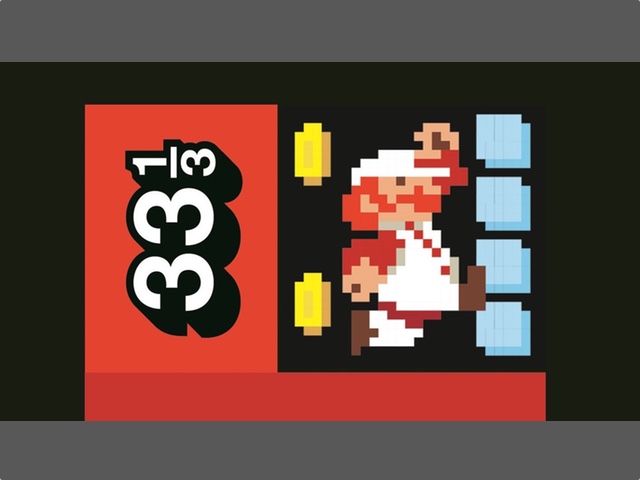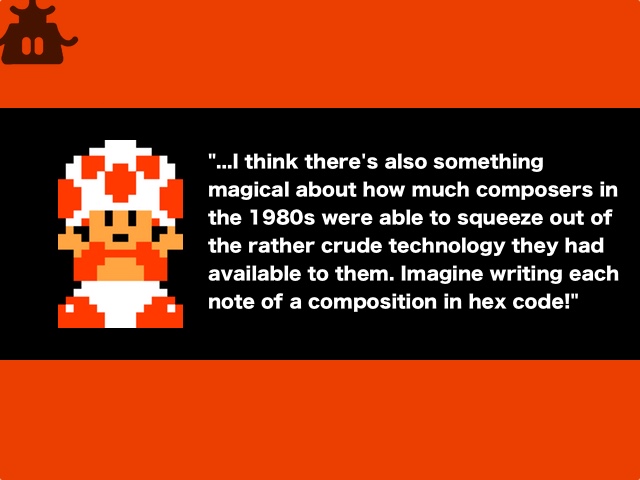
Koji Kondo’s Super Mario Bros. Soundtrack (33 1/3) isn’t a typical video game book. While there have been writers who have examined game design and game designers before, Andrew Schartmann’s study is one of the few pieces of writing that I’ve come across that so intricately deconstructs and analyzes the score and composer of a video game. It’s a heck of a read, but at Nintendojo we like to go beyond the pages of the book when we can and speak to the author whenever possible, and with Mr. Schartmann we were able to do exactly that! Read on as we discuss his thoughts on Koji Kondo, video game music, and his future projects!
Nintendojo: What inspired you to focus on Koji Kondo’s soundtrack for Super Mario Bros. for this installment of 33 1/3?
Andrew Schartmann: For one, it’s an iconic game, so I knew people would be interested. But more importantly, Super Mario Bros. revolutionized video game music and sound effects. The way Koji Kondo transformed the music of his inheritance into something that changed an entire industry is enough to inspire any musician—myself included. I mean, who wouldn’t want to connect with one of the great musical minds behind an art form that we now take for granted?!
ND: As you touched on in your writing, the Super Mario Bros. soundtrack, particularly its iconic overworld theme, is known the world over and still whistled, hummed, and remembered to this day by fans. Despite technological advances that allow for more nuanced and “realistic” sounding music in today’s video games, it’s songs like those from Koji Kondo’s pioneering work in the 80s that seem to be the most enduring; why do you think that is?
AS: That’s a tough question to answer, as I’m sure there are many factors at play. Nostalgia, for instance, certainly plays a role. But I think there’s also something magical about how much composers in the 1980s were able to squeeze out of the rather crude technology they had available to them. Imagine writing each note of a composition in hex code! At some level, I think people appreciate the patience it took to put that music together– not to mention the sheer innovation required to create many of the musical effects, like an echo or a plucked string sound.
ND: One thing I really took a shine to while reading your book was the notion that Kondo’s score is defined by so many outside factors beyond simply coming up with the music itself. With things to consider like technological limitations and needing to create synergy between the score and the gameplay, how do you think these constraints make Kondo’s work as a composer for Super Mario Bros. even more special?
AS: Kondo himself has said that technological advance is a double-edged sword. On the one hand, it makes your life a lot easier. But on the other hand, it doesn’t force you to be innovative in the same way. From my point of view, what sets Kondo apart is his constant desire go above and beyond. Doing the minimum amount of work deemed acceptable was never good enough for him.
Consider the number of days he spent playing demo versions of certain levels just to get a feel for how the game’s mechanics make a player’s body move. And then think about the time spent trying to recreate that bodily rhythm in his music. He wanted to create something revolutionary from the very beginning, and his determination to do so was relentless. That’s rare.

ND: Is there a contemporary piece of musical composition or score in a video game that you’re especially fond of?
AS: Austin Wintory’s score to Assassin’s Creed Syndicate is absolutely brilliant. It’s original, well-crafted, and captures the game’s atmosphere perfectly. It’s also very moving, which is not something I encounter often in a video game score.
I also love the Shovel Knight soundtrack, but I’m not sure it counts, since it’s based on the NES style!
ND: Besides Koji Kondo, which other video game composers do you admire?
AS: I’ll stick to NES composers. Otherwise we’ll be here all day! Six in particular always come to mind immediately: Koji Kondo, Hirokazu Tanaka, Nobuo Uematsu, Takashi Tateishi, David Wise, and Tim Follin. many people know the first four, since they composed music for iconic games (e.g., Zelda, Metroid, Final Fantasy, Mega Man 2), but Wise and Follin are also worth exploring. Their work really pushed the NES to its limits.
ND: Kondo’s score for Super Mario Bros., as you pointed out, was unique at the time in how it added another layer to the gameplay; without it, the experience would be far different. What do you think is the key to successfully incorporating music into a video game?
AS: A good video game score does much more than enhance the on-screen atmosphere. It engages a player’s emotions, and sometimes even plays on their physical reactions to game play (as in Super Mario Bros.). It also requires a seamless merger between sound effects and music. Some sound effects are meant to stick out; others are not, and should blend in with the music. This is not so easy, since it’s often difficult to predict when certain sound effects will be triggered. Even so, good developers achieve the right balance more often than not.
ND: What’s next for you as a writer? Do you have any more video game music-focused 33 1/3 or writing projects planned for the future?
AS: Bloomsbury’s 33 1/3 series allows one book per author, but I certainly wouldn’t turn them down if they asked me to write another book in that style! A large enough fan base might change their mind, but who knows?!
Other than that, I’m currently writing an academic book on music for the NES, though I’m doing my best to make sure it’s also appropriate for general readers. I’m also working on some essays devoted to other retro game music, e.g., Atari 2600, and in the near future, I’d like to write about the intersections between video game music and popular music.
ND: Has there ever been a soundtrack to a video game that you felt went largely under-appreciated or outright ignored? What did you think was especially noteworthy about it?
AS: Tim Follin’s Siver Surfer soundtrack is mind-boggling. I still can’t wrap my mind around how he achieved such a rich sound from the NES APU. It’s remarkable. Go and listen to the Level 1 theme. Now. Seriously!
Thank you again to Andrew Schartmann for the insightful interview, and click here to get hold of a copy of Koji Kondo of your own!




 ShareThis
ShareThis





